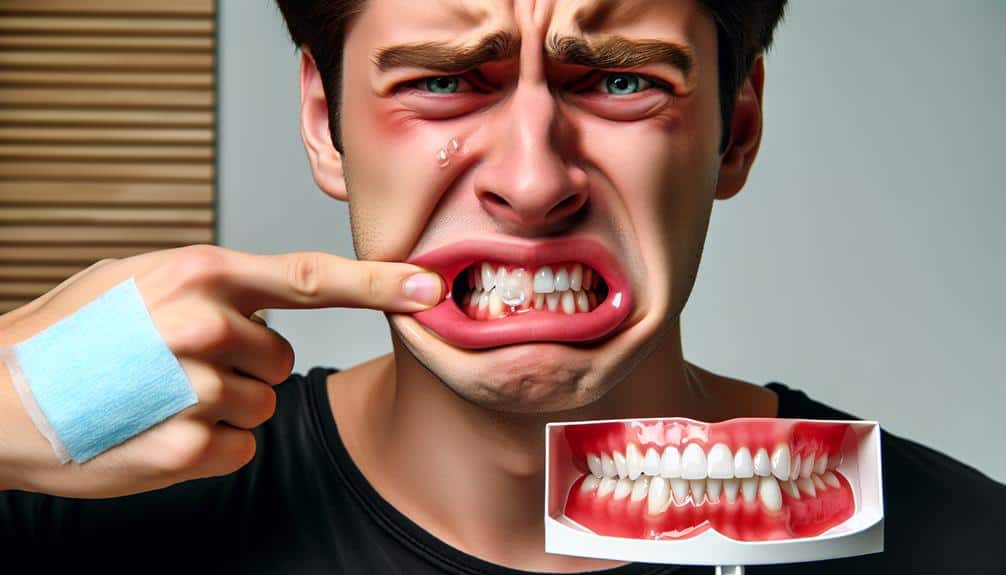If you're thinking about teeth whitening, it's important to understand the potential risks involved. Sensitivity can occur after treatment, so try desensitizing toothpaste and avoid extreme temperatures. Enamel damage is a concern with over-whitening, so follow product instructions and consult with a dentist. Watch out for gum irritation; use recommended toothpaste and gentle brushing techniques. Overusing whitening products can harm enamel and worsen sensitivity, so stick to guidelines and seek professional advice. Additionally, consider how whitening may affect existing dental work and consult your dentist for personalized recommendations. Balancing a bright smile with oral health is key.
Key Points
- Sensitivity may occur; use desensitizing toothpaste.
- Risk of enamel damage and discoloration with excessive whitening.
- Gum irritation possible; use soft-bristled brush and desensitizing toothpaste.
- Overuse can harm enamel; follow recommended guidelines.
- Consider impact on existing dental work like fillings and veneers.
Sensitivity After Whitening
If you experience sensitivity after undergoing a teeth whitening treatment, it's important to understand the potential causes and how to manage this common side effect. Precautionary measures can help minimize sensitivity post-treatment. Using desensitizing toothpaste before and after the procedure can be beneficial. Additionally, avoiding very hot or cold foods and beverages for a few days following the treatment can help reduce sensitivity.
When it comes to long-term effects and maintenance tips, practicing good oral hygiene is essential. Brushing with a soft-bristled toothbrush and using a toothpaste designed for sensitive teeth can aid in managing sensitivity. Regular dental check-ups are also important to monitor your oral health and address any concerns promptly. Moreover, avoiding highly pigmented foods and beverages that can stain your teeth can help maintain your whitening results.
Taking these precautionary measures and following proper post-treatment care can assist in managing sensitivity after teeth whitening and contribute to long-term oral health.
Enamel Damage Concerns
After addressing sensitivity concerns following a teeth whitening treatment, it's important to be aware of potential enamel damage risks that may arise. Enamel, the outer layer of your teeth, plays a vital role in protecting your teeth from decay and damage. Here are some key points to keep in mind regarding enamel damage concerns:
- Tooth Discoloration: Excessive or improper teeth whitening procedures can lead to tooth discoloration. This discoloration may occur as a result of enamel erosion, which exposes the underlying dentin, giving the teeth a yellowish appearance.
- Enamel Erosion: Enamel erosion is a serious risk associated with teeth whitening treatments. The chemicals used in whitening products, if not used correctly, can wear down the enamel over time, making your teeth more vulnerable to sensitivity, decay, and damage.
- Preventive Measures: To minimize the risk of enamel damage, it's essential to follow the instructions provided with the whitening product carefully. Additionally, consulting with a dental professional before undergoing any whitening treatment can help assess the health of your enamel and determine the most suitable whitening approach for you.
Gum Irritation and Sensitivity
Gum irritation and sensitivity are common side effects that may occur following a teeth whitening treatment. The bleaching agents used in whitening procedures can sometimes irritate the gums, leading to redness, tenderness, or even mild swelling. Additionally, some individuals may experience heightened tooth sensitivity to hot or cold temperatures after undergoing whitening treatments. While these effects are usually temporary and subside within a few days, it's essential to take precautions to prevent them.
To minimize gum irritation and sensitivity in the long term, it's advisable to follow post-whitening care instructions diligently. Using desensitizing toothpaste or gels recommended by your dentist can help alleviate discomfort. Gentle brushing with a soft-bristled toothbrush and avoiding acidic or overly hot/cold foods can also aid in preventing gum irritation and sensitivity. Additionally, scheduling regular dental check-ups can ensure that any issues are addressed promptly. Remember, proper aftercare plays an important role in maintaining oral health post-teeth whitening treatment.
Potential Risk of Overuse
Excessive use of teeth whitening products can pose potential risks to your oral health and overall well-being. While wanting a brighter smile is understandable, it's important to be mindful of how often you're whitening your teeth. Here are some essential points to bear in mind:
- Long term effects: Overuse of teeth whitening products can lead to enamel damage, increased tooth sensitivity, and even harm to the gums. It's vital to follow recommended guidelines and not exceed the specified usage to prevent long-term repercussions.
- Proper maintenance: Consistent overuse of whitening treatments can result in the need for more extensive dental interventions down the line. To avoid this, it's crucial to consult with your dentist on the appropriate frequency and methods of teeth whitening suitable for your oral health.
- Professional advice: Seeking guidance from a dental professional can help you create a personalized whitening plan that balances your desire for a radiant smile with the need to maintain ideal oral health in the long run.
Impact on Existing Dental Work
Continuing with teeth whitening treatments may impact any existing dental work you have undergone, potentially leading to complications or alterations in their effectiveness. The effect on fillings is a key consideration. Teeth whitening treatments can have varying effects on different types of fillings.
While composite fillings don't whiten and may require replacement to match the new tooth color, amalgam fillings aren't affected by whitening agents. Additionally, the compatibility of veneers with teeth whitening procedures is important.
Veneers aren't permeable like natural teeth, so they don't respond to whitening agents. If you have veneers, whitening treatments can result in uneven coloration, making them stand out from your natural teeth.
It's essential to consult your dentist before undergoing teeth whitening if you have existing dental work. They can assess the type of work you have had done and provide personalized recommendations to guarantee the best outcomes while preserving the integrity of your dental work.
Frequently Asked Questions
Can Teeth Whitening Treatment Cause Permanent Damage to the Enamel?
Teeth whitening treatment can potentially cause permanent damage to the enamel if not done correctly. Enamel erosion is a long-term effect to watch for. Strengthening enamel through aftercare techniques is essential to minimize risks.
How Long Does Sensitivity After Whitening Typically Last and How Can It Be Managed?
When you whiten your teeth, sensitivity may linger for a few days. To manage this, use desensitizing toothpaste, avoid hot or cold foods, and follow aftercare instructions. Prevention is key for a comfortable whitening experience.
Are There Any Specific Risks Associated With Overusing Teeth Whitening Products?
Using teeth whitening products excessively can lead to various risks. Overuse consequences may include increased tooth sensitivity, gum irritation, or even damage to tooth enamel. It's important to follow guidelines to avoid health concerns.
Can Gum Irritation and Sensitivity From Whitening Treatments Lead to Long-Term Issues With Oral Health?
You might think gum irritation and sensitivity from whitening treatments are just temporary discomforts, but over time, they could impact your oral hygiene. Prioritize long-term oral health when considering cosmetic dentistry procedures.
How Does Teeth Whitening Treatment Impact Existing Dental Work Such as Fillings or Crowns?
When contemplating teeth whitening therapy, it is crucial to assess the compatibility with current fillings and the potential impact on crowns. Address restoration concerns to avoid any negative cosmetic interactions and maintain peak oral health.



